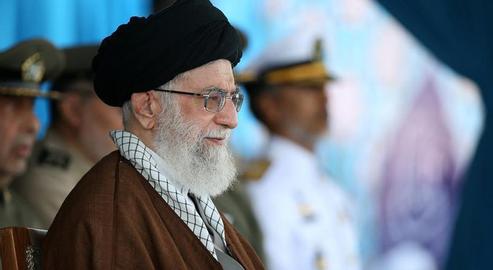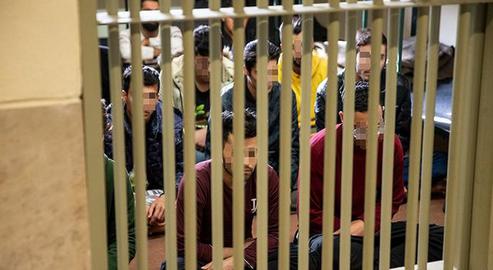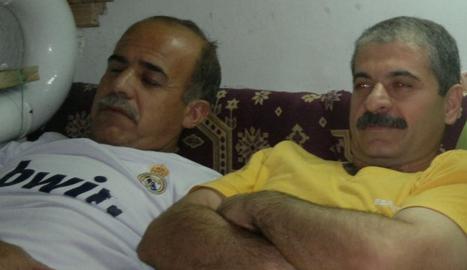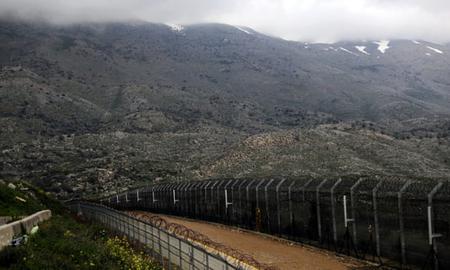This month, more than 150 political prisoners and prisoners of conscience in Iran were due to receive a pardon from the Supreme Leader to mark the occasion of the birth of the Prophet Muhammad. Judiciary spokesperson Gholamhossein Esmaili duly gave a televised speech confirming that 157 prisoners were set to be released, on the suggestion of judiciary head Ebrahim Raeisi and with Ayatollah Khamenei’s blessing: a report that spread like wildfire across Iran’s state-controlled media.
The news was so widely publicized that for a brief moment, hope entered the hearts of many political and ideological prisoners in Iran, to say nothing of their families, loved ones and supporters. It was even said that 50 people who had participated in the November 2019 protests were on the pardon list.
But neither they, nor others whose names reportedly figured on the list, have yet been released. Among them are two men who were sentenced to life imprisonment, Omar Faqihpour and Khaled Fereydouni, who have now been behind bars for more than 20 years. These two inmates at Urmia Prison were led to understand that they would soon be released. But both have now been returned to their cells, newly crushed by yet another empty promise.
***
Omar Faqihpour was arrested in Mahabad, West Azerbaijan, in September 2000, and accused of membership of the Kurdistan Democratic Party. Khaled Fereydouni was arrested in Mahabad in September of that year on a similar charge.
Both men were initially sentenced to death on charges of moharebeh (war against God). Their sentences were later commuted to life imprisonment, and both were initially sent to Rajai Shahr and then Karaj Prisons before being transferred to Urmia. For the first 10 years at Rajai Shahr and Karaj they were denied a single visit for their families, and even to this day they have not once been granted furlough. Their requests for a retrial have also been rejected out of hand.
To make matters worse, this is not the first time Faqihpour and Fereydouni have had the prospect of release snatched away from them. They and their families have repeatedly been told their names were on ceremonial pardon lists in the past, most recently in August 2019. But over and over, their hopes have been dashed. Over time, this has come to constitute a form of double torture that alongside the decades in prison, has wreaked havoc on the psyches of these two inmates and their families.
Bahman Ahmadi-Amouei, a journalist who spent two and a half years with Faqihpour and Fereydouni in Rajaei Shahr Prison, told IranWire that he had last spoken to them just a few days earlier and could hear the despair in their voices. “Their voices were very sad,” he said. “They said, ‘If they don’t want to pardon us, why do they tell us our names are on the amnesty list every year? We were getting on with our lives.’
“Because of this, they cannot bear day-to-day life in the prison. If, as a prisoner, you don’t receive visits, or financial assistance, or family support, you become vulnerable. When you spend 20 years inside without leave, you become vulnerable. When your family has no place to follow up the case and there is no one to hold your hand, you become vulnerable. The judicial system forgets about you.
“The judiciary is required to review cases every few years to determine whether a prisoner deserves amnesty or their sentence commuted. But nothing works in our system. All of this makes them vulnerable."
In the last two months, Amouei says, after a pardon of Faqihpour and Fereydouni was first proposed anew by the judiciary, the pair had given various required commitments to the judiciary, the intelligence services, the prison and the prosecutor’s office. Their families had even sent across their identification documents to facilitate the release. But despite their doing everything that was asked of them, nothing happened.
The definition of life imprisonment differs according to the county. In many sovereign nations it denotes a period of 20 or 30 years, not the rest of a convict’s natural life. In Iran, however, it is taken literally: a convict issued with this sentence will die behind bars unless they receive a pardon from the Supreme Leader of the Islamic Republic.
Now, Amouei says, before anything else, Omar Faqihpour and Khaled Fereydouni are in dire need of care. "Care means their release and their return to the arms of their families. The release of these people would pose no danger to the Islamic Republic. Even were they to be released, they would have to spend years adapting to the changes in society and people’s attitudes [since they were imprisoned]. And it’s not only these two: there are also many other prisoners who have been forgotten by the Iranian judicial system, and by some human rights institutions too."
Omar Faqihpour and Khaled Fereydouni are now in their early 50s. When Omar Faqihpour was first arrested in 2000, he had a one-year-old daughter, who is now 20 years old. The pair do menial tasks in prison or crochet to make ends meet. Former cellmates remember them as quiet, amiable people with no obvious political affiliation, who showed no desire at all to establish political connections either. And yet, after 20 years, they are still called mohareb.
Outside of the prison walls, judiciary officials continue to trumpet their own “generosity” using every means at their disposal, while state-controlled media outlets wax lyrical about “change”. Inside, though, little changes. There are those for whom eternity is the interior of a cell, and for whom prospect of release, rather than a source of comfort, has become a punishment in its own right.
visit the accountability section
In this section of Iran Wire, you can contact the officials and launch your campaign for various problems



























comments